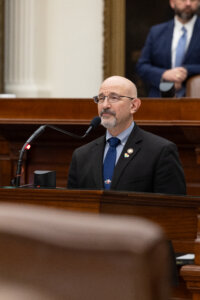Texas may soon require schools to post the Ten Commandments. Meet the Jewish lawmaker fighting back.
Rep. Jon Rosenthal is the only Jewish member of the Texas House

Texas State Rep. Jon Rosenthal, joined by fellow Democratic Texas state representatives, speaks at a 2021 press conference in Washington, D.C. Photo by Kevin Dietsch/Getty Images
It’s not easy being the only Jewish member of the Texas state house.
Rep. Jon Rosenthal, a Democrat, navigates a chamber where colleagues wear pins depicting a Christian cross overlaid with an American flag. During policy debates, Bible scripture is quoted freely. And the Republican state chair has said “there is no separation between church and state.”
Some Republican representatives are “boldly Christian nationalist” and “make really overt references to religion when debating law,” Rosenthal said. “It’s wild.”
So Rosenthal wasn’t surprised by the state legislature’s latest effort to infuse Christianity into Texas schools: A bill requiring the Ten Commandments to be displayed in every public school classroom.
Both the Texas House and Senate passed the bill, which is now headed to the desk of Republican Gov. Greg Abbott, who has indicated he will sign the bill into law. A federal judge struck down as unconstitutional a similar law requiring schools to display the Ten Commandments in Louisiana last November.
As the lone Jewish voice in the legislature, Rosenthal said he feels a special obligation to represent Jewish perspectives on issues like these. That’s rarely a straightforward mandate — after all, Jews often disagree. But this was a rare instance of consensus among the Jews and Jewish organizations he consulted, he said.
“The First Amendment calls for the government to not advance or oppose any religion, and this clearly does that,” he said. “People were pretty unified that this doesn’t belong in public schools — because folks value the separation of church and state.”
Rosenthal introduced an amendment that would have required public schools to display the Jewish and Catholic versions of the Ten Commandments, in addition to the Protestant version, which all have slightly different wording. The amendment’s failure to pass, he argued, showed the hypocrisy of the bill’s supporters.
“The fact that they will argue it’s only about values and not about religion, I think it’s a pretty disingenuous talking point,” he said. “The whole thrust of this, I think, is to get a case in front of a newly formed Supreme Court.” The U.S. Supreme Court has had a 6-3 conservative majority since 2020.
Another Texas state Democratic representative, James Talarico, went viral for his questioning of the bill’s Republican sponsor, Candy Noble, pointing out that she had broken the commandment not to work on the Jewish Sabbath by deliberating the bill on Saturday.
“Do you think that members of the legislature should focus more on trying to follow the Ten Commandments rather than telling others to follow them?” Talarico said on the House floor.
Texas schools are already required to display “In God We Trust” posters as long as they come from donors, and at least one Texas school board rejected donors who wanted the phrase displayed in Arabic. The Texas Board of Education approved the use of a Bible-infused curriculum in November, which incorporates Christianity into elementary school lessons on subjects from math to poetry. Yet another bill headed to Gov. Abbott’s desk would allow for prayer time in public schools.

That agenda concerns Rosenthal, who views the laws as “boldly unconstitutional.” The 61-year-old with a salt-and-pepper goatee and rectangular-frame glasses represents a district outside of Houston with a large Muslim population and zero synagogues. He flipped his district from red to blue in 2019 after defeating a 12-term incumbent.
“I feel it’s incumbent on me to be a voice for Jewish communities. But I clearly have way more Islamic communities in the district I represent,” he said. “I strive to bring these folks together.”
Rosenthal was raised as a Reform Jew in an interfaith home, by a Jewish father and Christian mother. He grew up as a “university brat,” moving frequently to different college towns following his father’s career as a mathematics professor. At 14, he lived in Israel for a year during his father’s sabbatical at Hebrew University of Jerusalem, attending classes in Hebrew and becoming conversational in the language.
The family settled in Texas when Rosenthal was a teenager, and his father joined the faculty at the University of Texas at Austin. Rosenthal went on to study mechanical engineering and worked in the oil and gas industry for 30 years before becoming politically active in 2017, motivated to fight back against Donald Trump’s first presidency.
“Not only am I the only Jew in the legislature,” he said. “I’m also the only mechanical engineer.”
Now, Rosenthal identifies as both agnostic and “multireligious” — though Jewish first in a list of many. He frequents services at synagogues, mosques and churches. Rosenthal chose to swear into office on a Torah he received as a bar mitzvah gift. “It’s got my name on it,” he said. “It’s really cool.”
His religious identity sometimes confounds his colleagues. On social media, Rosenthal has responded to criticism that he is “hardly ‘Jewish,’” after he refused to back a bill curbing antisemitism until an amendment was added clarifying that the law would not target protected speech under the First Amendment. “I’m deeply steeped in Jewish tradition and philosophy,” he said.
His Republican colleagues don’t typically consult him when drafting resolutions about Israel.
“Nobody talked to me about those things,” he said. “There would be whole groups, you know, getting together to resolve or honor this or that, without apparently caring if there was a Jewish person in the assembly.”
Rosenthal has also faced his share of antisemitic comments during his time in the House, though he believes they come from a place of ignorance rather than malice. He’s heard stereotypical remarks about Jews and money, and after organizing a cigar night for members, a colleague asked, “Why is it that all the Jewish people I know love cigars?”
The place of Jews in the Texas legislature has stirred controversy in Texas politics before: In 2010, a Republican megadonor reportedly told the former Jewish Speaker of the Texas House, Republican Joe Straus, that only Christians should hold leadership positions.
Still, Rosenthal said the environment in the House is collegial.
“We routinely work together. We seek common ground,” Rosenthal said. “We just stay away from the Christian nationalist stuff.”















